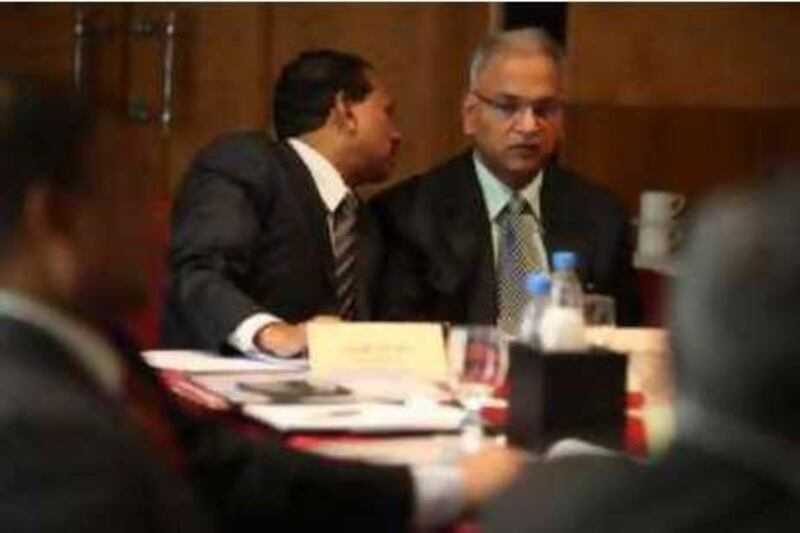DUBAI // The chairman of Air India has said he will make it his personal mission to help relatives of the victims of last month's Mangalore crash, and promised to iron out the technical problems that have plagued its budget carrier's flights in recent weeks. "We will take care of the families," said Arvind Jadhav during his first visit to Dubai since he took over Air India's top post in May of last year.
He added that he would help victims' families find jobs and also set up a trust fund to assist them. "This is my personal pledge," he said. The May 22 crash of an Air India Express flying from Dubai to Mangalore killed 158 people. The airline also faces passenger criticisms over delays and poor service. The carrier plans to strengthen its engineering support base in the Gulf region, add flights and set up an area call centre to address complaints.
"Systemic issues have to be set right with organisational backup," Mr Jadhav said. "We will ? sign contracts with maintenance and repair organisations here so engineering issues will be taken care of by local companies. A significant 60 to 65 per cent of our delays should be taken care of." While technical problems should be sorted out by the middle of next month, a call centre based in Trivandrum, southern India, should be ready within the week, he said.
There are also plans to have backup aircraft and crews on standby. The airline may add as many as 250 low-cost or regular flights, with an increase in frequency to Mumbai, Delhi, Bihar, Calcutta and Chennai, he said. Those flights may not be full unless factors causing delays are sorted out. Hundreds of Air India Express passengers have been stranded over the past month because of technical malfunctions, with travellers in Sharjah and India's Pune city waiting 36 hours and 26 hours, respectively. Passengers complained they waited for hours before even being informed of delays.
"The recent plane crash, followed by a series of events, have severely affected the image of Air India Express," said KM Basheer, the president of the All India Airport Users' Forum and a customer of the airline for 28 years. "Passengers are now in fear. There is a possibility that its percentage of commuters may reduce." An Air India Express flight meant to carry the victims' families to the accident site was grounded on the day of the crash because of technical problems. Staff members of its parent company, Air India, went on a lightning strike just hours after the crash.
Mr Jadhav apologised, but said there was no drop in the number of passengers flying Air India Express after the crash. However, some expatriate Indians said they now avoided the airline unless they had no other choice. "I travel by Air India Express only when I can not get any other flight," said KV Shamsudeen, who lives in Abu Dhabi. "I just can't trust them. I used to feel that I must travel by it as it's a national airline, but now I avoid it."
Edwin Lobo, a Mangalore resident who has lived in Dubai for eight years, echoed Mr Shamsudeen's sentiments, saying he stopped using Air India Express a year ago after waiting eight hours at the airport due to technical problems. The airline's management denies claims that its operational and engineering infrastructure do not meet the required standard. It says the track record of Air India Express has been outstanding with 99.5 per cent of its flights taking off on time. The carrier operates between four UAE cities and 17 destinations in India.
Indian aviation experts say that the low-cost carrier has created an image in the Gulf of attracting customers who are lower middle-class expatriates or single men. "Specific delays will not affect the business of the airline, especially as it is a low-budget carrier," said John Siddharth, a commercial aviation analyst at Frost and Sullivan, a business and research consulting firm. "Such government-owned carriers take passengers for granted, which is not digested by people who have other options."
@Email:rtalwar@thenational.ae pmenon@thenational.ae






